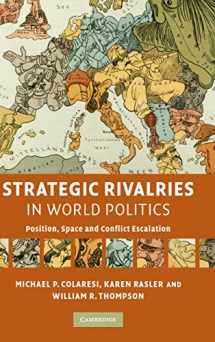
Strategic Rivalries in World Politics: Position, Space and Conflict Escalation
ISBN-13:
9780521881340
ISBN-10:
052188134X
Edition:
1
Author:
William R. Thompson, Michael P. Colaresi, Karen Rasler
Publication date:
2008
Publisher:
Cambridge University Press
Format:
Hardcover
330 pages
Category:
International & World Politics
,
Politics & Government
FREE US shipping
Book details
ISBN-13:
9780521881340
ISBN-10:
052188134X
Edition:
1
Author:
William R. Thompson, Michael P. Colaresi, Karen Rasler
Publication date:
2008
Publisher:
Cambridge University Press
Format:
Hardcover
330 pages
Category:
International & World Politics
,
Politics & Government
Summary
Strategic Rivalries in World Politics: Position, Space and Conflict Escalation (ISBN-13: 9780521881340 and ISBN-10: 052188134X), written by authors
William R. Thompson, Michael P. Colaresi, Karen Rasler, was published by Cambridge University Press in 2008.
With an overall rating of 3.8 stars, it's a notable title among other
International & World Politics
(Politics & Government) books. You can easily purchase or rent Strategic Rivalries in World Politics: Position, Space and Conflict Escalation (Hardcover) from BooksRun,
along with many other new and used
International & World Politics
books
and textbooks.
And, if you're looking to sell your copy, our current buyback offer is $0.3.
Description
International conflict is neither random nor inexplicable. It is highly structured by antagonisms between a relatively small set of states that regard each other as rivals. Examining the 173 strategic rivalries in operation throughout the nineteenth and twentieth centuries, this book identifies the differences rivalries make in the probability of conflict escalation and analyzes how they interact with serial crises, arms races, alliances and capability advantages. The authors distinguish between rivalries concerning territorial disagreement (space) and rivalries concerning status and influence (position) and show how each leads to markedly different patterns of conflict escalation. They argue that rivals are more likely to engage in international conflict with their antagonists than non-rival pairs of states and conclude with an assessment of whether we can expect democratic peace, economic development and economic interdependence to constrain rivalry-induced conflict.


We would LOVE it if you could help us and other readers by reviewing the book
Book review

Congratulations! We have received your book review.
{user}
{createdAt}
by {truncated_author}


